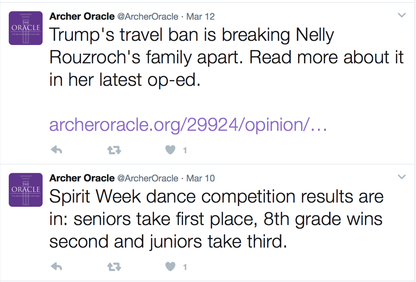 Two recent posts from my student journalists' news site Twitter. They use social media to share recently published stories and report on breaking news. Two recent posts from my student journalists' news site Twitter. They use social media to share recently published stories and report on breaking news. Social media has had such a profound effect on journalism that it's sometimes hard to remember how traditional news functioned before it. Reading this 2009 MediaShift article is a powerful reminder that Twitter wasn't always the source of breaking news. In fact, as author Julie Posetti wrote just eight years ago, "Some employers are either so afraid of the platform or so disdainful about its journalistic potential that they've tried to bar their reporters from even accessing Twitter in the workplace." Not accessing Twitter in the newsroom? It's laughable now. Yet for some high school newsrooms, this is still the case. Overzealous school policies banning the use of various forms of social media and cell phones at school cripple student journalists who need to learn these tools in order to survive and thrive in our new media world.
However, setting students loose with social media journalism without strong guidelines is just as problematic. Just as professional news producers such as NPR have developed thorough social media policies, advisers should work with their student edition board to develop a robust social media policy for their own publications. A place to start when tackling this task is to look to professional models like NPR's. This recap of a 2014 panel about the ethics of social media news is another good resource. For scholastic guidance, check out JEA's SPRC’s foundation materials or this 2012 Social Media Toolbox masters project — though a bit dated, it still contains some great lessons and ideas. For help convincing administration of the value of social media in the newsroom, Quill & Scroll's Principal's Guide to Scholastic Journalism has a strong rationale and additional resources. As you develop your guidelines, however, it's important to consider both sides of social media journalism: not only how to use it as a tool to share information or report a breaking story, but also how to use it as a reporter seeking information — the importance of verification so not to spread misinformation. For this second part of the equation, the Columbia Journalism Review's "Best Practices for Social Media Verification" and the Online News Association's Social Newsgathering Ethics Code are good places to start. Our student journalists deserve to use the same tools as the professionals, but they also need the same caliber of ethics and responsible practices to guide them. These guidelines must be specific, yet flexible, as social media platforms are constantly evolving. With guidance for how to post to social media as a journalist and how to use it as a reporting tool, students will be uniquely poised to take new media journalism to places we can't yet even imagine.
1 Comment
Carrie R
3/31/2017 10:48:15 am
Your point that student journalists can be mistrusted by administrators (or even advisers) is true. We must prove that we can act ethically and professionally in the media we have to prove that we can be trusted with new media as well.
Reply
Leave a Reply. |
About“And though she be but little, she is fierce!” -A Midsummer Night’s Dream Archives
December 2020
Categories
All
|

 RSS Feed
RSS Feed